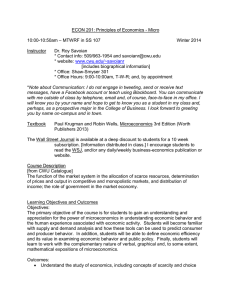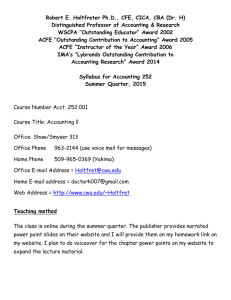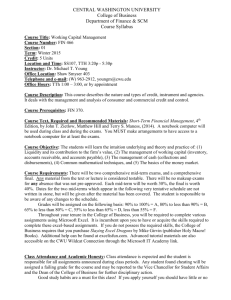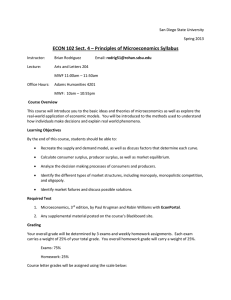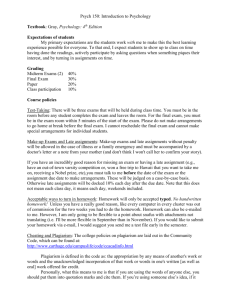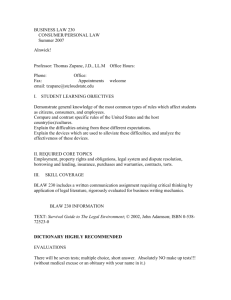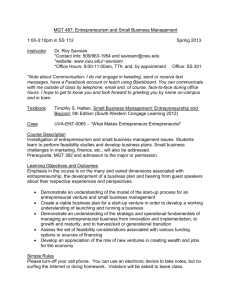Syllabus
advertisement
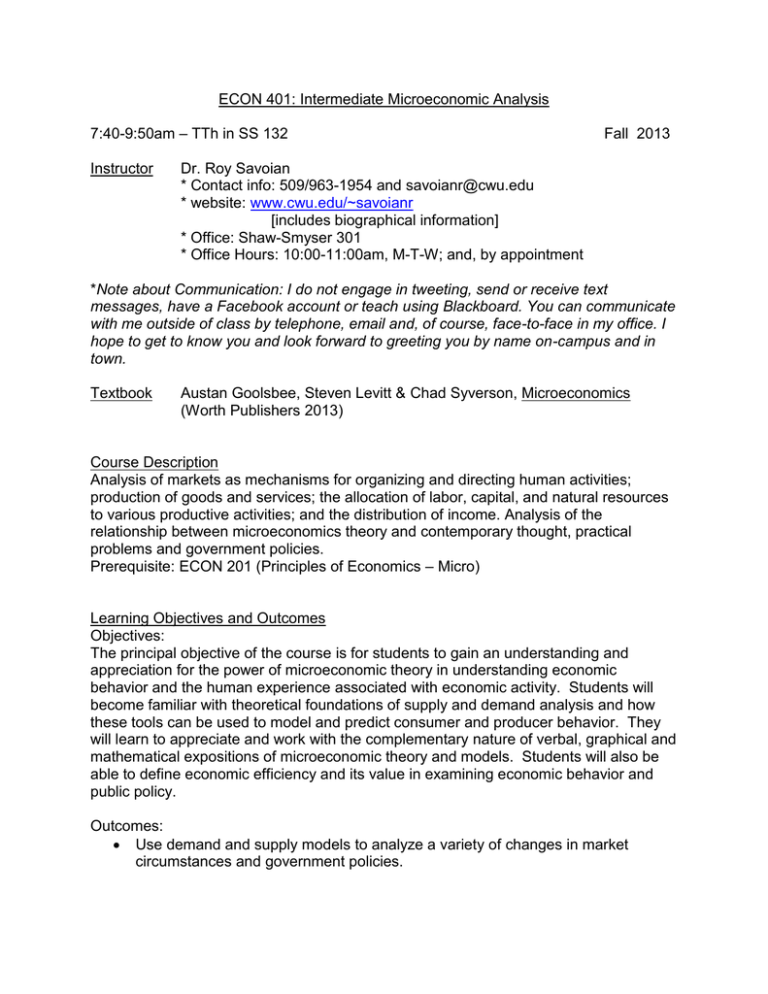
ECON 401: Intermediate Microeconomic Analysis 7:40-9:50am – TTh in SS 132 Instructor Fall 2013 Dr. Roy Savoian * Contact info: 509/963-1954 and savoianr@cwu.edu * website: www.cwu.edu/~savoianr [includes biographical information] * Office: Shaw-Smyser 301 * Office Hours: 10:00-11:00am, M-T-W; and, by appointment *Note about Communication: I do not engage in tweeting, send or receive text messages, have a Facebook account or teach using Blackboard. You can communicate with me outside of class by telephone, email and, of course, face-to-face in my office. I hope to get to know you and look forward to greeting you by name on-campus and in town. Textbook Austan Goolsbee, Steven Levitt & Chad Syverson, Microeconomics (Worth Publishers 2013) Course Description Analysis of markets as mechanisms for organizing and directing human activities; production of goods and services; the allocation of labor, capital, and natural resources to various productive activities; and the distribution of income. Analysis of the relationship between microeconomics theory and contemporary thought, practical problems and government policies. Prerequisite: ECON 201 (Principles of Economics – Micro) Learning Objectives and Outcomes Objectives: The principal objective of the course is for students to gain an understanding and appreciation for the power of microeconomic theory in understanding economic behavior and the human experience associated with economic activity. Students will become familiar with theoretical foundations of supply and demand analysis and how these tools can be used to model and predict consumer and producer behavior. They will learn to appreciate and work with the complementary nature of verbal, graphical and mathematical expositions of microeconomic theory and models. Students will also be able to define economic efficiency and its value in examining economic behavior and public policy. Outcomes: Use demand and supply models to analyze a variety of changes in market circumstances and government policies. Develop the theory of demand from assumptions concerning consumer preferences and income constraints. Develop theories of cost and supply from underlying production relationships and input prices. Analyze the effect of changes in market structure on firm behavior. Understand the nature of economic efficiency and its relationship to market structure. Use economic efficiency to analyze the effects of government policy on markets. Textbook Features Important issues and examples are featured through-out the text in each chapter to connect microeconomic theory to the real world. It is strongly suggested that you read these features and be prepared to discuss them in class and/or on an exam. Theory and Data - summarizes economic research and uses the empirical dimension to reveal the reality behind the theory. Application - shows how microeconomic theory informs consumer and producer decision making in real situations. Freakonomics - features essays to encourage students to develop as economic thinkers by showing them how economics can illuminate common as well as uncommon phenomena. Your study strategy and preparation for exams should also include sections in each chapter: "Figure it out" worked-out problems, "Make the grade" essays, and "End-ofchapter" study aids. Exams, Assignments and Grading Unit Exams: 60 points each x 4 Unit Exams Homework: 10 points each x 4 assignments Comprehensive Final Exam TOTAL 90% and above 80-89% 70-79% 60-69% 59% and below = A- or A = B-, B or B+ = C-, C or C+ = D-, D or D+ =F = 240 points (60%) = 40 points (10%) = 120 points (30%) = 400 points 360-400 points 320-359 280-319 240-279 239 or less You are expected to attend class when all Exams are scheduled. There are NO makeup exams or early exams. So, please plan your social or travel schedule accordingly. Exams will be comprised of essay questions and problems. You are expected to write in a clear and grammatically correct manner, and to clearly label graphs. You are also expected to show your work in calculating a solution to homework and exam problems. Course Schedule: Week Date 1 Th-Sept 26 Chapters/Topics Syllabus/Introduction Preface Ch. 1-Overview 2 T-Oct 1 Th-Oct 3 Ch. 2-Supply and Demand 3 T-Oct 8 Th-Oct 10 Ch. 3-Using Supply and Demand 4 T-Oct 15 UNIT EXAM 1 Ch. 4-Consumer Behavior Assignments Due: Homework #1 Th-Oct 17 5 T-Oct 22 Th-Oct 24 Ch. 5-Individual and Market Demand 6 T-Oct 29 UNIT EXAM 2 CB “Economic Outlook Conference” [SURC Theatre] Ch. 6-Producer Behavior Th-Oct 31 7 T-Nov 5 Th-Nov 7 Ch. 7-Costs 8 T-Nov 12 UNIT EXAM 3 Ch. 8-Supply in Competitive Market Due: Homework #2 Due: Homework #3 Th-Nov 14 9 T-Nov 19 Th-Nov 21 Ch. 9-Market Power and Monopoly Due: Homework #4 10 T-Nov 26 Th-Nov 28 UNIT EXAM 4 Thanksgiving Holiday 11 T-Dec 3 Th-Dec 5 Ch. 10-Market Power and Pricing Strategies (pp. 395-403) Ch. 11-Imperfect Competition (pp. 439-449) COMPREHENSIVE FINAL EXAM: Thursday, December 12 at 10:00am-12noon Students with Disability Students with a disability who wish to set up an academic adjustment in this class should submit their “Academic Accommodation Plan” found on the Disability Services website at www.cwu.edu/disability-support/ The Disability Services Office is located in Bouillon 140 or ds@cwu.edu or 963-1202. Seating and Class Attendance Please sit in the same seat for all class meetings. You are expected to attend all class meetings. However, you are allowed two (2) excused or unexcused absences. Two class meetings represent one week of material and information. After 2 absences, 10 points will be deducted for each absence. College of Business: Statement of Conduct and Code of Honor The College of Business is a learning community committed to a set of core values based on integrity, respect and responsibility that guide our interactions. Integrity: the quality of possessing and steadfastly adhering to high moral principles or professional standards Respect: to show consideration or thoughtfulness in relation to others Responsibility: the state, fact, or position of being accountable and responsible As College of Business students we pledge to uphold these standards of professionalism and conduct ourselves in accordance with them. We will not lie, cheat, or steal, and will not tolerate those who do. Our behavior defines who we are and what we will become. Simple Rules Please turn-off your cell phone. You can use an electronic device to take notes, but no surfing the Internet or doing homework. Violators will be asked to leave class. Furthermore, by virtue of enrollment in a College of Business course, all students are expected to commit themselves to learning the material and to act in a civil manner in class and be respectful of their peers and the professor. Behaviors to the contrary will result in disciplinary action and possible expulsion from the class. Class Conduct Students are expected to complete assignments -- reading as well as written -- by the deadline. Any student caught cheating will be removed from the class with an "F." He or she will also be subject to the fullest provisions of the CWU Student Handbook, including suspension and/or expulsion from the university. Plagiarism (i.e., taking an idea or writing from another and passing it off as one's own) on assignments is considered cheating. Looking at another student's exam during a test is also cheating. Any other misrepresentation of one's work will also be subject to consideration as cheating. Conclusion .... Cheating will not be tolerated!
